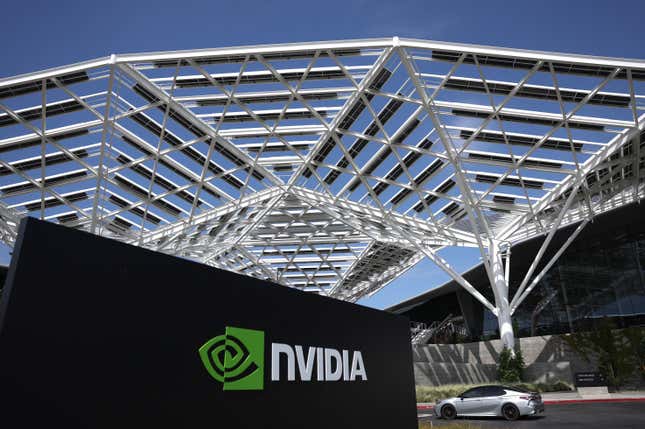
In This Story
A day after Nvidia NVDA was reported to have been subpoenaed by the U.S. Justice Department in its antitrust probe, the chipmaker says it actually has not be subpoenaed.
“We have inquired with the U.S. Department of Justice and have not been subpoenaed,” an Nvidia spokesperson said in a statement shared with Quartz on Wednesday. “Nonetheless, we are happy to answer any questions regulators may have about our business.”
The chipmaker was reported to have been subpoenaed by U.S. officials on Tuesday by Bloomberg, which cited unnamed people familiar with the matter. The Justice Department had also reportedly subpoenaed other companies for evidence after complaints that the chipmaker is possibly violating antitrust laws.
In June, the Justice Department and the Federal Trade Commission reached a deal to carry out antitrust investigations into Nvidia and fellow artificial intelligence industry leaders Microsoft and OpenAI.
U.S. officials are reportedly concerned over complaints that include how Nvidia has made it difficult for its customers to work with other chip providers. The Department of Justice reached out to the chipmaker’s competitors, including Advanced Micro Devices and AI chip startups, to gather information, including on allegations of threatening customers who buy products from competitors, and on Nvidia’s recent acquisitions of AI software startups, The Information reported in August, citing unnamed people familiar with the matter.
“Nvidia wins on merit, as reflected in our benchmark results and value to customers, who can choose whatever solution is best for them,” an Nvidia spokesperson said in a previous statement shared with Quartz.
Shares of the chipmaker fell in after-hours trading on Tuesday after the Bloomberg report. However, its shares were already down 9.5% at the market close, resulting in a market capitalization loss of $279 billion — the largest-ever single-day drop in market value for a U.S. company, according to Reuters. Meanwhile, Nvidia chief executive Jensen Huang lost an estimated $9.8 billion from the plunge, according to Bloomberg.





